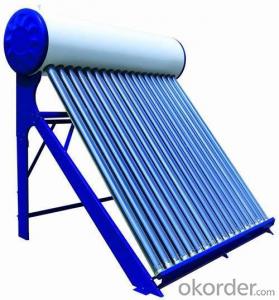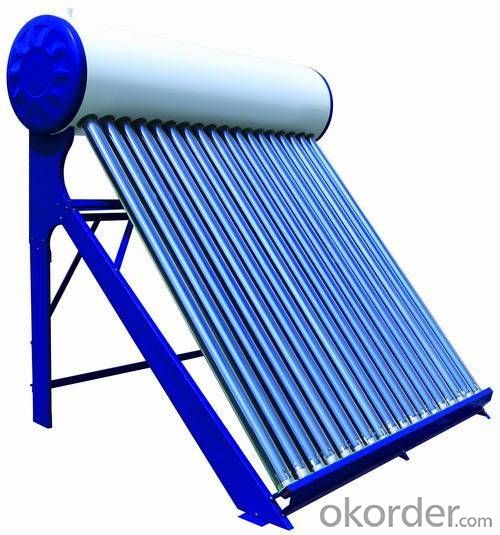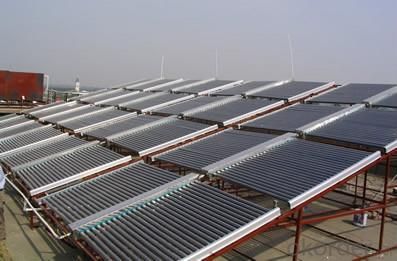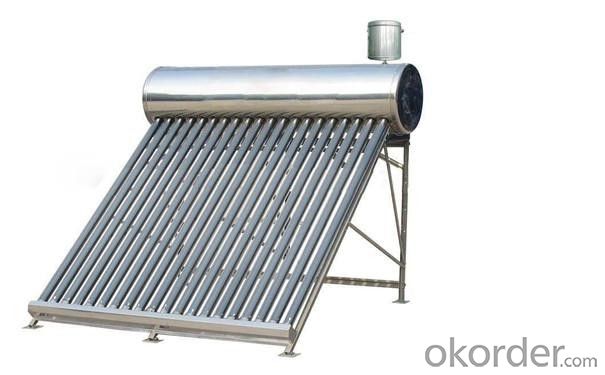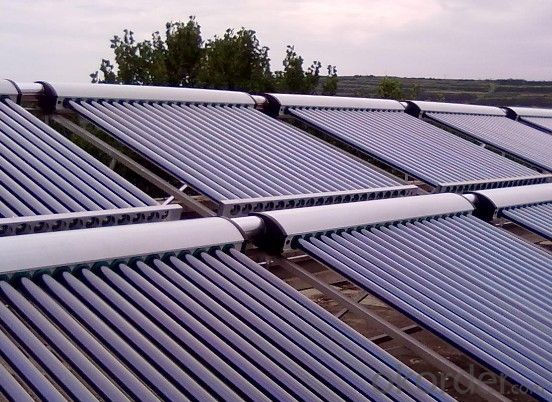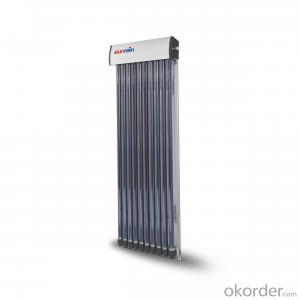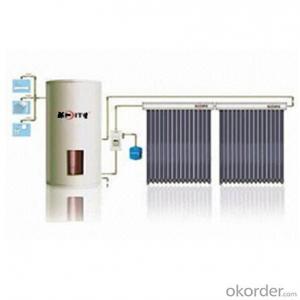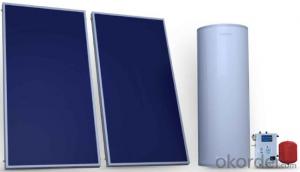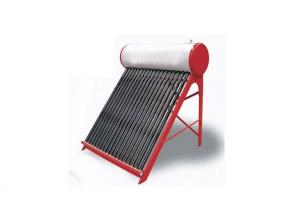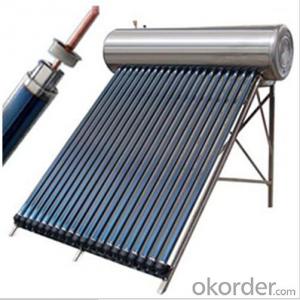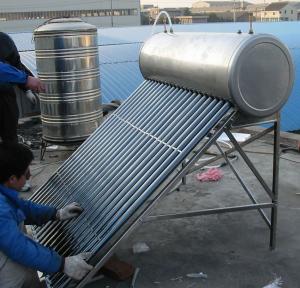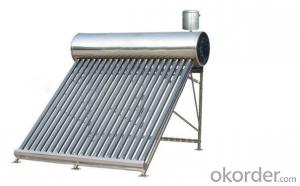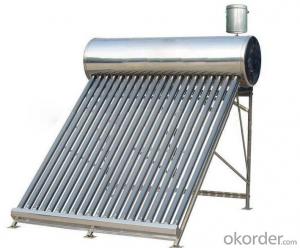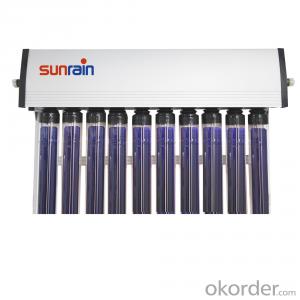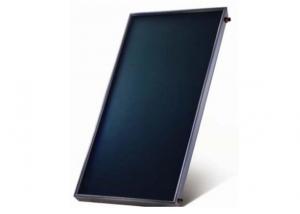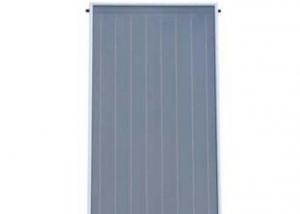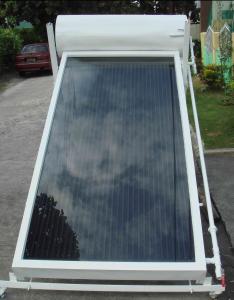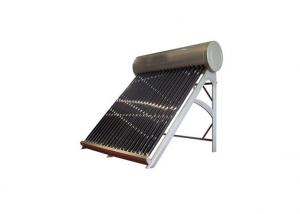Solar Water Heater Cost - Integrated Unpressurized Solar Hot Water Heater
- Loading Port:
- China main port
- Payment Terms:
- TT OR LC
- Min Order Qty:
- 10 set
- Supply Capability:
- 10000 set/month
OKorder Service Pledge
OKorder Financial Service
You Might Also Like
Introduction of Non-Pressure Solar Water Heater:
Non-pressure Solar Heater is one of the most economical solar water heating device with pretty high efficiency at the same time. It consists of hot water storage tank, solar vacuum tubes with mouth plug in storage tank, and bracket supporting tank and tubes.When cold water in evacuated tubes is heated with solar irradiation, as the specific gravities of hot water and cold water are different, hotter water goes upward to storage tank and colder water goes downward to glass tubes. through this continuous circulation, the cold water in storage tank will be gradually heated till sunset.
Solar water heaters working principle
1. The solar collector absorbs solar energy and transmits it to the solar water heater tank through circulation
2. When the temperature of the collector reaches the set value, the controller starts the circulation pump automatically
3. The circulation pump makes heat-conducting liquid circulate automatically
4. The heat-conducting liquid transfers heat to water by lower heat exchanger in the water tank.
5. When the temperature difference between solar collector and heat pipe solar water heaters tank doesn't reach the set value, the circulation pump will be shut automatically
6. In case the temperature of the water tank does not reach Tmax, Electric Heating Element will start to work automatically
Solar water heaters working station component:
1. Operating screen
2. Manometer
3. Pump speed adjust switches
4. Temperature difference circulation pump
5. Flow rate indicator
6. Return circuit connector
7. Safety valve
Solar water heaters specification:
Description | solar water heaters |
Material of out manifold | 0.55mm thickness color steel/ fluorine carbon steel |
Material of inner tank | Food grade 2.0 mm thickness SUS304 stainless steel |
Tank insulating layer | 40mm 45kg/m³ high-density polyurethane foamed |
Inlet and outlet hole | Male G1'' |
Max pressure | 0.6 Mpa |
Solar collector tube | 3.3 Borosilicate glass with N/Al coating |
Thickness of glass tube | 1.6mm |
Vacuum tube tightness | P≤0.005 Pa |
Absorption | as=0.93-0.96 (AM1.5) |
Emission ratio | εh=0.04-0.06 (80C±5C) |
Idle sunning property parameters | Y=220~260m2.C/KW |
Average heat loss coefficient | ULT=0.6~0.7W/(m2.C) |
Bracket: | 2.0mm thickness aluminum alloy |
Tank weight | 75KGS |
Tank size | 560mm Dia x 1810mm Height |
Tank capacity | 300L |
Solar collector | 2pcs 58x1800x15tube solar collector |
Absorber area | 2.811 m² |
Working station | SP116 working station |
Heat exchanger length | Upper:12m, Underside:18m |
Solar water heaters details show:
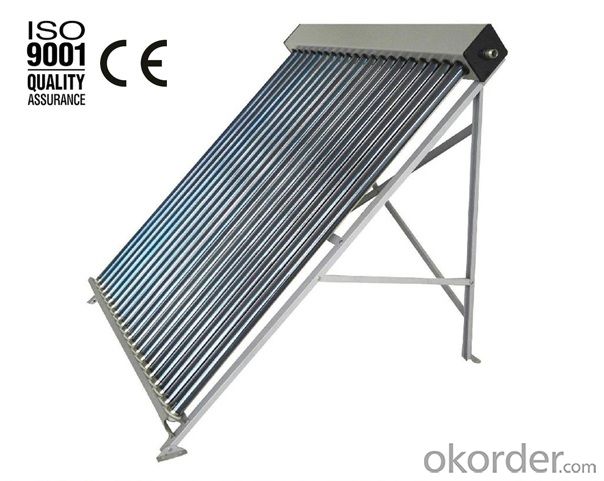
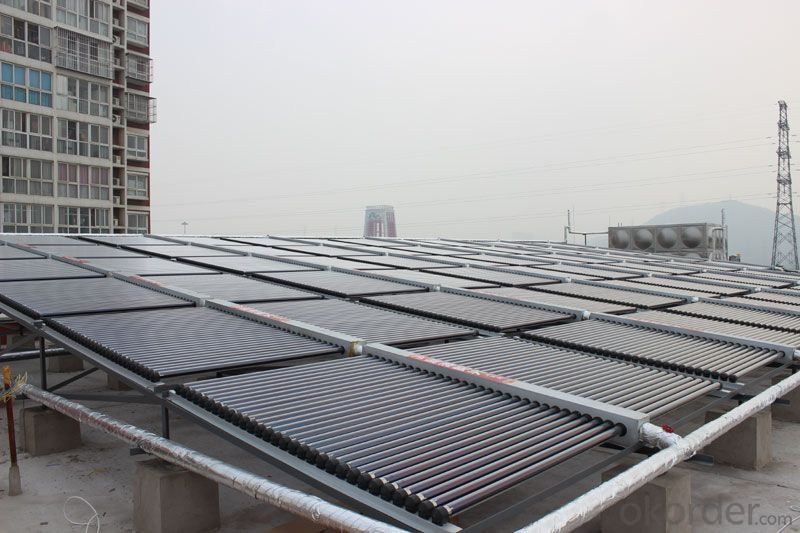
Benefits of this kind of solar water heaters:
1. Prolong the life of your existing water heater
2.Costs less than an electric, gas or oil water heater
3.No maintenance required
4.Lasts longer than a traditional hot water heater
5.Reduce your water heating costs
- Q: How does the water pressure affect the performance of a solar water heater?
- The water pressure plays a crucial role in the performance of a solar water heater. Higher water pressure allows for better flow rate, ensuring efficient heat transfer from the solar collectors to the water. It helps in maintaining a constant supply of hot water and reduces the time required for heating. On the other hand, low water pressure can hinder the system's performance by decreasing the flow rate and slowing down the heating process. Therefore, adequate water pressure is essential for optimal performance of a solar water heater.
- Q: How does the orientation of solar panels affect the performance of a solar water heater?
- The orientation of solar panels plays a crucial role in determining the performance of a solar water heater. The ideal orientation for solar panels is to face them directly towards the sun. When panels are properly oriented, they receive maximum sunlight exposure, resulting in higher energy absorption and conversion. The position of the sun changes throughout the day, so the orientation of the solar panels should be optimized for maximum efficiency. In the northern hemisphere, panels should face south, while in the southern hemisphere, they should face north. This allows the panels to capture sunlight directly, ensuring optimal performance. If solar panels are not properly oriented, their efficiency will be reduced. For example, if panels face east or west, they will not receive the same amount of direct sunlight as panels facing south or north. This leads to lower energy absorption and conversion, resulting in reduced performance of the solar water heater. Furthermore, the tilt angle of solar panels also affects their performance. The optimal tilt angle depends on the latitude of the installation location. Adjusting the tilt angle allows panels to capture sunlight more effectively, especially during winter months when the sun is lower on the horizon. In conclusion, the orientation of solar panels is crucial for maximizing the performance of a solar water heater. Properly orienting the panels towards the sun and adjusting the tilt angle based on the location's latitude will result in higher energy absorption and conversion, leading to optimal efficiency and performance of the solar water heater.
- Q: What is the impact of nearby tall trees or vegetation on the performance of a solar water heater?
- The impact of nearby tall trees or vegetation on the performance of a solar water heater can be significant. The efficiency of a solar water heater is dependent on receiving maximum sunlight exposure throughout the day. When tall trees or dense vegetation are located near the solar water heater, they can cast shadows on the solar panels, reducing the amount of sunlight that reaches the system. Shadows from nearby trees or vegetation can block a significant portion of the sunlight, resulting in reduced energy production and lower heating performance. This can lead to decreased water temperature and lower overall efficiency of the solar water heater. Additionally, trees or vegetation can also impact the airflow around the solar panels, affecting heat dissipation and potentially leading to overheating. Proper airflow is essential for maintaining the optimal operating temperature of the solar water heater. Regular maintenance and monitoring are necessary in such cases to ensure that the solar panels remain unobstructed and clean from any debris or fallen leaves. Trimming or removing nearby trees or vegetation that cast shadows on the solar panels may be necessary to improve the performance of the solar water heater. In conclusion, nearby tall trees or vegetation can have a negative impact on the performance of a solar water heater by blocking sunlight and interfering with airflow. Regular maintenance and monitoring, along with potential tree trimming or removal, are crucial to maximizing the efficiency and effectiveness of the solar water heating system.
- Q: Can a solar water heater be used in areas with strict building codes?
- Yes, a solar water heater can be used in areas with strict building codes. However, it is important to ensure that the solar water heater system complies with all the applicable building code requirements and regulations. This may include obtaining permits, adhering to specific installation guidelines, and meeting safety standards. Consulting with local authorities or a professional installer specializing in solar water heaters can help navigate any building code restrictions and ensure compliance.
- Q: Can a solar water heater be used in areas with limited access to solar installers?
- Yes, a solar water heater can be used in areas with limited access to solar installers. Solar water heaters are relatively simple systems that can be installed and maintained by individuals with basic technical knowledge. There are many resources available online, including instructional videos and manuals, that can guide users through the installation process. Additionally, local plumbing or construction professionals can often assist in the installation if required. Overall, with some research and basic skills, it is possible for individuals in areas with limited access to solar installers to successfully install and use a solar water heater.
- Q: How does a solar water heater impact the carbon footprint of a household?
- A solar water heater can significantly reduce the carbon footprint of a household. By harnessing the sun's energy to heat water, it eliminates the need for traditional heating methods like gas or electricity, which often rely on fossil fuels. This reduction in energy consumption results in lower greenhouse gas emissions, helping to mitigate climate change and reduce the household's carbon footprint.
- Q: Can a solar water heater be used in areas prone to freezing temperatures?
- Solar water heaters can indeed be used in regions that experience freezing temperatures. However, it is necessary to take precautions to prevent any damage caused by freezing. Typically, solar water heaters use either antifreeze or a heat transfer fluid to ensure that the water does not freeze within the system. This fluid moves through the solar collector, collecting heat from the sun and transferring it to the water storage tank. The antifreeze or heat transfer fluid is specially formulated to have a freezing point lower than that of water, guaranteeing that it remains in a liquid form even in freezing temperatures. Furthermore, solar water heaters in cold climates often include freeze protection mechanisms, such as insulation, insulated pipes, and temperature sensors that activate backup heating systems if the temperature drops too low. By implementing these measures, solar water heaters can operate effectively in areas that are prone to freezing temperatures and provide hot water even during the winter months.
- Q: Can a solar water heater be used in areas with frequent power surges?
- Yes, a solar water heater can be used in areas with frequent power surges. Solar water heaters rely on the sun's energy to heat the water, so they are not directly affected by power surges. However, it is important to ensure that the solar water heater's electrical components, such as the pump or controller, are protected with surge protectors or voltage regulators to prevent damage from power surges.
- Q: What is the maintenance cost of a solar water heater?
- The maintenance cost of a solar water heater is generally low. Routine maintenance tasks such as cleaning the panels and checking for any leaks may be required, but they are minimal and can usually be done by the homeowner. Additionally, since solar water heaters have fewer moving parts compared to traditional water heaters, the chances of major repairs or replacements are significantly reduced, leading to lower maintenance costs in the long run.
- Q: Can a solar water heater be used in areas with strict setback requirements?
- Yes, a solar water heater can be used in areas with strict setback requirements. The setback requirements typically apply to the placement of structures like buildings and fences, whereas solar water heaters are considered as renewable energy systems and are often exempted from such regulations. However, it is always advisable to consult local building codes and regulations to ensure compliance before installing a solar water heater.
Send your message to us
Solar Water Heater Cost - Integrated Unpressurized Solar Hot Water Heater
- Loading Port:
- China main port
- Payment Terms:
- TT OR LC
- Min Order Qty:
- 10 set
- Supply Capability:
- 10000 set/month
OKorder Service Pledge
OKorder Financial Service
Similar products
Hot products
Hot Searches
Related keywords
